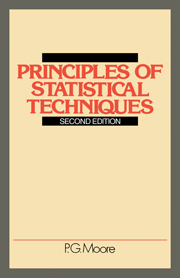 Principles of Statistical Techniques
Principles of Statistical Techniques Book contents
- Frontmatter
- Contents
- Preface
- 1 The Scope of Statistics
- 2 The Collection of Data
- 3 The Tabulation of Data
- 4 The Pictorial Representation of Data
- 5 Frequency Distributions
- 6 Averages
- 7 Measures of Dispersion
- 8 Probability and Sampling
- 9 The Binomial Theorem
- 10 Further Probability Concepts
- 11 Tests of Significance
- 12 Further Tests of Significance
- 13 Sampling Techniques
- 14 Simulation
- 15 Time Series
- 16 Pairs of Characters
- Solutions to Exercises
- Bibliography
- Index
2 - The Collection of Data
Published online by Cambridge University Press: 03 February 2010
- Frontmatter
- Contents
- Preface
- 1 The Scope of Statistics
- 2 The Collection of Data
- 3 The Tabulation of Data
- 4 The Pictorial Representation of Data
- 5 Frequency Distributions
- 6 Averages
- 7 Measures of Dispersion
- 8 Probability and Sampling
- 9 The Binomial Theorem
- 10 Further Probability Concepts
- 11 Tests of Significance
- 12 Further Tests of Significance
- 13 Sampling Techniques
- 14 Simulation
- 15 Time Series
- 16 Pairs of Characters
- Solutions to Exercises
- Bibliography
- Index
Summary
In the opening stages of a statistical inquiry the investigator will need to collect a large amount of raw material or data from which to extract the quantities relevant to the purposes that he has in mind. Thus the market research investigator may have to collect data on consumer preferences after four different sets of advertisements have appeared; the botanist may have to spend several days in a grassland area counting the number of shoots of Solidago glaberima per square foot; the traffic investigator may have to count traffic at a busy crossing; the agriculturalist may have to collect data concerning the quantity of fertiliser applied to wheat crops on all the farms in Sussex. The method and care given to the collection of this raw material is important. The strength of a chain lies in the strength of its weakest link and it is useless to reach intricate conclusions from insufficient or inaccurate data. Before making any form of elaborate analysis it is essential to know the limitations and accuracy of statistical material and to be aware of the kind of errors that can arise. In this chapter two of the most common sources of data will be considered in some detail. These are:
(i) Questionnaires. The data here are obtained by forms designed by the statistician and completed by the general public.
(ii) Observations. The data here are collected by the investigator himself recording the results of a series of observations but not necessarily relying on the public at large for his information.
Information
- Type
- Chapter
- Information
- Principles of Statistical TechniquesA First Course from the Beginnings, for Schools and Universities, with Many Examples and Solutions, pp. 9 - 23Publisher: Cambridge University PressPrint publication year: 1969